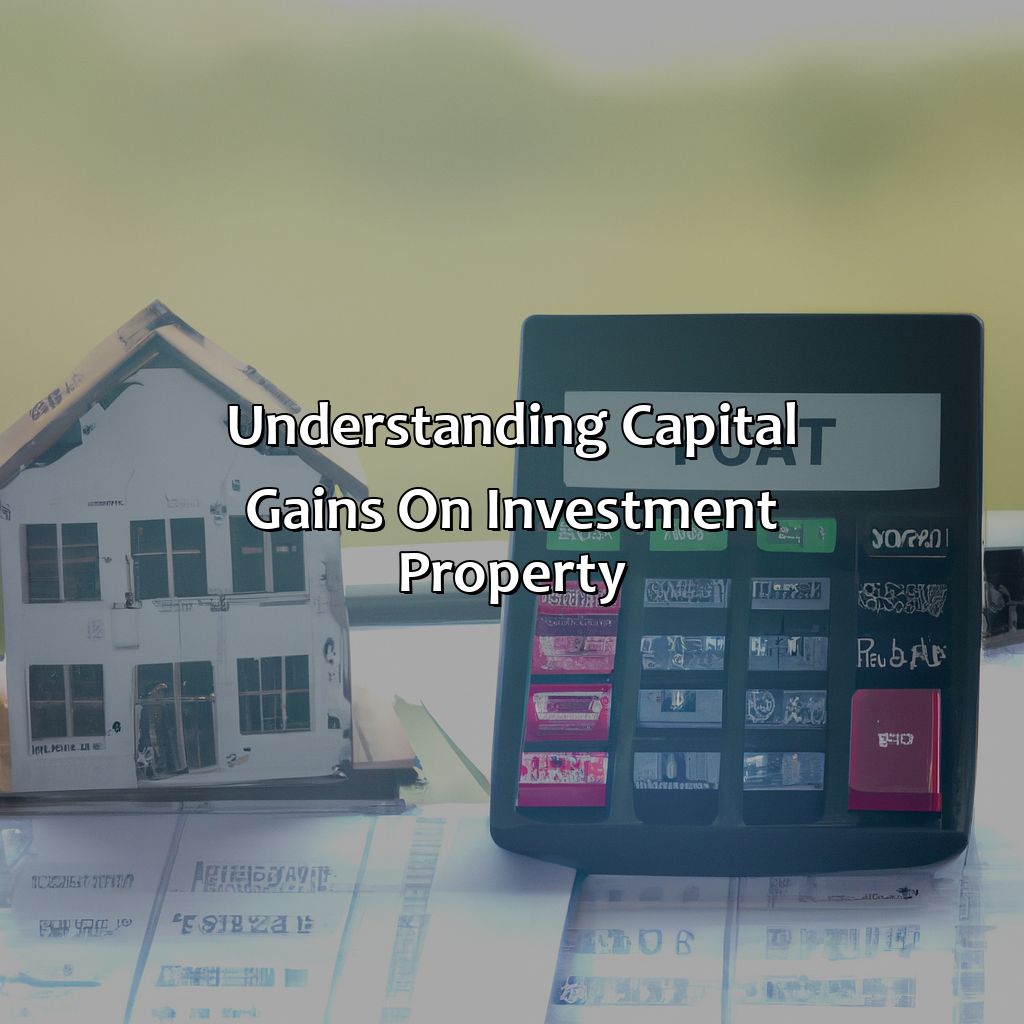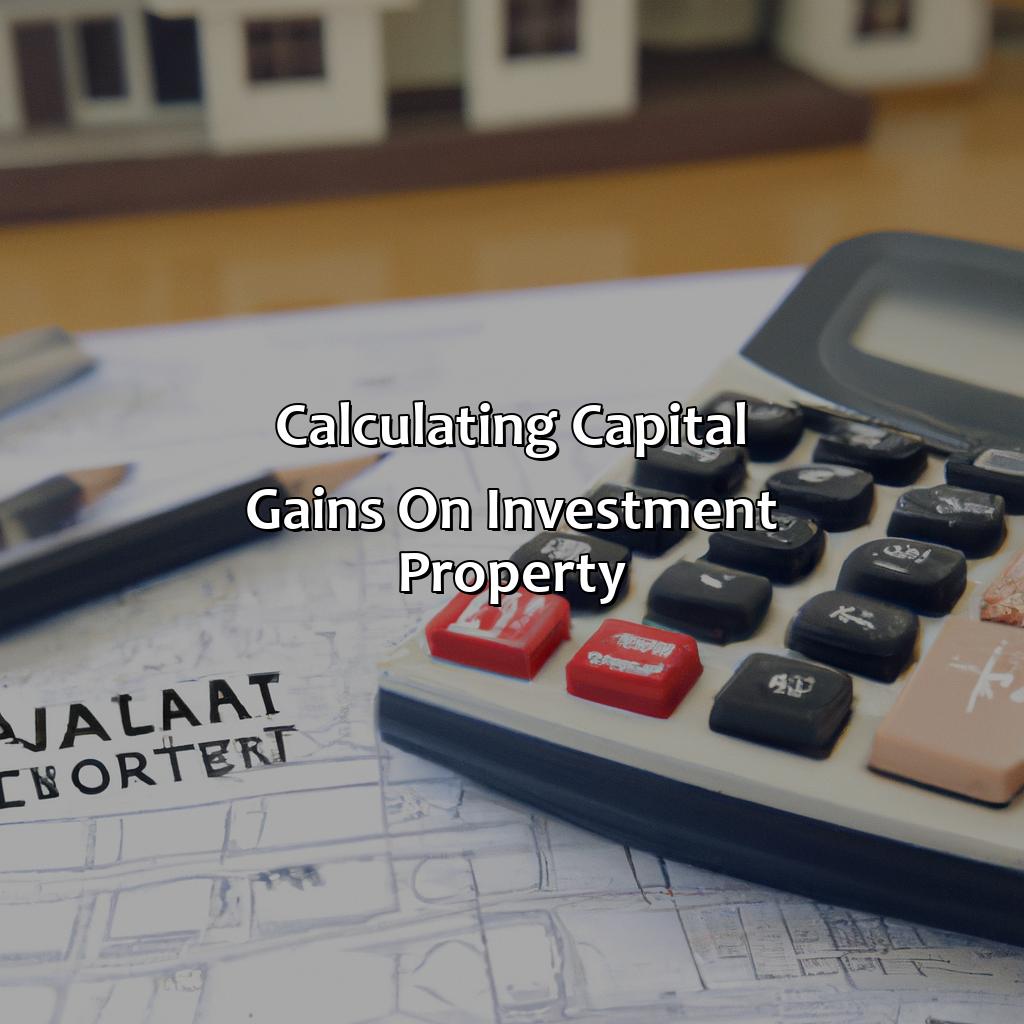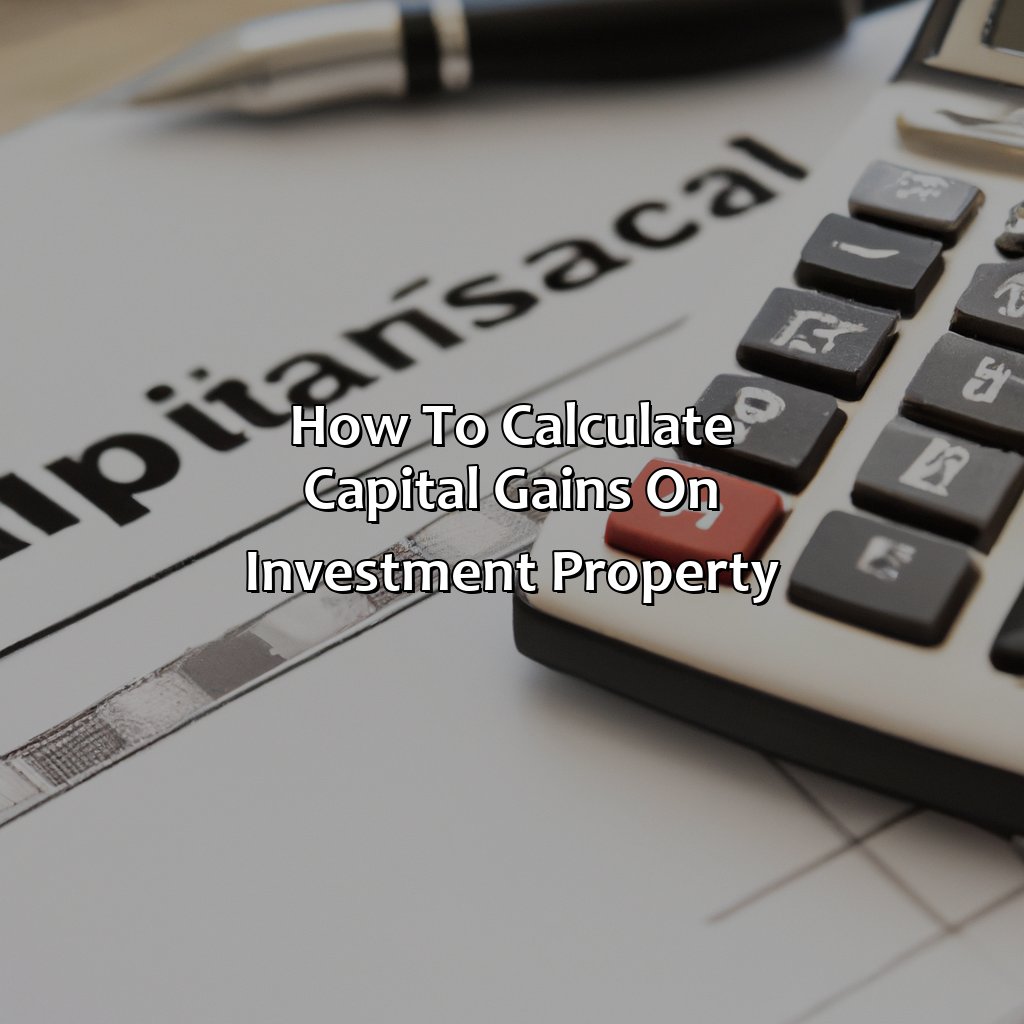How To Calculate Capital Gains On Investment Property?
Key Takeaway:
- Understanding capital gains on investment property requires knowledge of the factors that affect them, such as the property purchase price, improvement costs, and selling price.
- Calculating capital gains involves determining the property’s basis, subtracting it from the selling price, and adjusting for closing costs to arrive at the taxable capital gain.
- To minimize tax liability, it’s important to consider tax laws and regulations, including 1031 exchanges and depreciation recapture.
Are you an investor unsure about how to calculate capital gains on investment property? Let this blog guide you through the calculation process, so you can maximize profits and minimize tax payments. With this helpful information, you can confidently invest in properties with peace of mind.
Understanding Capital Gains on Investment Property
Investment properties are unique assets that can increase your wealth if managed correctly. Calculating capital gains on investment property is a crucial aspect of property ownership. By comprehending the ins and outs of capital gains, you can optimize your investment return.
When selling an investment property, capital gains are the profit you make from the sale. The calculation is simple – subtract the original purchase price from the sale price. This profit is then subject to capital gains tax at a specific rate, depending on your country’s legislation.
Understanding how capital gains are calculated, including the different types of costs associated with owning a property, such as improvement expenses, is vital for accurate taxation and the maximization of profit.
It is important to note that tax laws regarding capital gains on investment properties can vary from country to country, so it is imperative to seek professional advice.
Don’t be caught off guard by capital gains tax and miss out on the potential profits that a well-managed investment property can bring. Arm yourself with knowledge, seek expert advice, and take full advantage of the benefits of investing in property.

Image credits: retiregenz.com by Adam Arnold
Factors that Affect Capital Gains
Let’s get a better idea of the factors influencing your capital gains on investment property. Check out the “Factors that Affect Capital Gains” section in “How to Calculate Capital Gains on Investment Property?“. Here, you’ll find out how the purchase price, improvement costs, and selling price of the property all contribute to your final capital gains.

Image credits: retiregenz.com by Harry Jones
Property Purchase Price
The estimated value of the property you intend to buy is a critical variable in calculating your capital gains. The amount that the asset has cost you, also known as its purchase price, is a significant determinant of how much money you will make if you sell it later on.
The following table shows the various costs associated with buying a property:
| Type | Cost |
|---|---|
| Purchase Price | $300,000 |
| Closing Costs | $15,000 |
| Renovations | $20,000 |
| Recurring Costs | $5,000 (Property Taxes & HOA) |
While the closing expenses and renovation fees are essential costs to consider when calculating your property acquisition value, the actual buying rate will have the most substantial impact on your overall return on investment.
Local zoning restrictions can influence how much you pay for a home. In one ZIP code compared to another location only miles away, real estate assets with identical features can cost significantly different prices. According to John Burns Real Estate Consulting, home values across 10 diverse US markets increased by over 10% year over year in May 2021.
Improvement costs may increase your capital gains, but at least you’ll have a fancy new kitchen to cry in when you see your tax bill.
Improvement Costs
The expenses incurred during property improvement can be a significant factor in determining capital gains. Here’s what you need to know:
- Remodeling Costs: Any costs involved in structural renovations to the property, including electrical, plumbing or any other major repairs, can be added to the cost base of the property.
- Maintenance Costs: Routine maintenance and smaller improvements are usually not included as part of the cost base but can still be claimed as deductions against rental income.
- Selling Costs: Expenses incurred while selling the property, such as advertising, real estate agent commissions and legal fees incurred for settlement, cannot be included in the capital gain but may be claimed as expenses against income earned from it.
It’s important to note that the improvement costs incurred should have a direct impact on the value of the property. If they don’t add substantial value, they cannot be added to the cost base.
Pro Tip: Keep records of all expenses over an extended period since you aren’t aware when improvements cease impacting your property value.
Remember, the property selling price isn’t just a number, it’s the birthplace of either your financial success or future regret.
Property Selling Price
When it comes to determining the worth of your investment property, the transactional value is referred to as Property Sales Price. The property sales price serves as a starting point for calculating capital gains from the sale if it exceeds the original cost of your property.
Different factors affect the Property Sales Price such as location, infrastructure, market trends, and demand. By analyzing these key factors and working with a trusted real estate agent or appraiser, you can determine an accurate selling price that maximizes your profit.
It’s essential to consider all costs associated with selling property while listing it for sale at a price. These may include fees for surveys, brokerages, advertising expenses incurred along the way. Overlooking these costs can result in underestimating actual net profit.
Pro tip: consulting with experienced professionals aids in establishing an ideal sales price by obtaining an accurate valuation of your property that captures its fair market value.
If making money on investment property was easy, everyone would be a real estate tycoon – but luckily for us, we enjoy the challenge of calculating capital gains.
Calculating Capital Gains on Investment Property
Calculating capital gains on investment property? No problem! You need to figure out the property’s basis, subtract it from the selling price, adjust for closing costs, and then calculate the tax liability. We are here to guide you through this whole process and make sure your capital gains are calculated accurately.

Image credits: retiregenz.com by Joel Jones
Determine the Property’s Basis
To determine the basis of your investment property, you need to have a comprehensive record of all the costs incurred to acquire and improve it. These costs include the original purchase price, legal fees, and closing expenses paid at the time of acquisition. You should also keep track of any subsequent capital improvements made over time, such as major renovations or additions. Finally, consider any depreciation taken or allowed on the property when calculating its basis.
It is essential to maintain accurate records of all expenses related to an investment property as these will provide critical information when it comes to calculating capital gains. By keeping your records up-to-date and organized, you can minimize your tax liability by taking advantage of deductions that can be claimed against your taxable gains.
Remember that determining the basis of your investment property is only one step in calculating capital gains accurately. Other factors that may impact this calculation include changes in market conditions or tenant occupancy rates and variable interest rates that may affect financing costs.
In summary, tracking the basis of your investment property is crucial for staying on top of potential tax liabilities and maximizing returns on your real estate holdings. To ensure success in this area, consider consulting with a qualified tax professional who can advise you on the latest regulations and best practices relating to investment properties. Don’t miss out on valuable opportunities to minimize losses or maximize returns by taking ownership over this essential aspect of managing your investments today!
Get ready to do some serious math – or just hope your calculator hasn’t been drinking.
Subtract Basis from Selling Price
When selling an investment property, deducting the basis from the selling price is a critical step in calculating capital gains. This process involves subtracting the total cost of investment (basis) from the amount of money earned after sale (selling price).
Here’s a 3-step guide to help calculate this in detail:
- Calculate the total purchase price paid for acquiring the investment property
- Add up all expenses incurred during ownership, such as repairs, maintenance and improvements
- Subtract this sum (basis) from the selling price to arrive at your capital gains on selling your investment property.
It’s important to note that deducting inflation and depreciation is essential when determining a property’s current market value. This will provide a more comprehensive idea of how much your property has truly appreciated over time.
While understanding capital gains and calculating them might sound daunting at first, overlooking it could result in severe penalties or missed opportunities. Make sure you have gone through everything with a fine-toothed comb before making any decisions.
Don’t miss out on valuable earnings by failing to calculate your capital gains accurately. Always consult with a financial advisor or tax professional to ensure you’re doing everything correctly.
Closing costs are like the necessary evil of investment property sales- they may sting a bit, but hey, at least you’ll have more accurate capital gains calculations.
Adjust for Closing Costs
When calculating capital gains on investment property, it is important to account for all the expenses incurred during closing. This can include various fees such as appraisal costs, title insurance premiums, attorney fees, and real estate agent commissions. All of these expenses can reduce the net sales proceeds and ultimately decrease the taxable amount of capital gain.
To adjust for closing costs while calculating capital gains on investment property, you need to deduct these amounts from the total sale price of the property. For instance, if you sell an investment property for $200,000 but incurred $10,000 in closing costs, you would subtract that amount from the sale price to get a net sales proceeds value of $190,000. This figure would be used in calculating your capital gains tax instead of the original sale price.
It’s worth noting that certain expenses related to closing cannot be deducted as they are considered part of the cost basis for your property. These may include any repairs or improvements made prior to selling your property. To ensure accurate reporting on your taxes, it’s recommended that you consult with a tax accountant or professional.
By adjusting for closing costs when determining capital gains on investment property, investors can reduce their tax liability and potentially increase their overall profits. Don’t overlook this critical step in calculating your financial gains from real estate investments.
Whoever said death and taxes were the only certainties clearly never owned an investment property.
Calculate Capital Gain Tax Liability
Determining the tax you owe on the gain you have made from your investment property can be a complex process. It involves various factors such as the purchase price, sell price, and improvement costs. Here’s how you can calculate the tax on capital gains from your investment property.
- Start by subtracting the initial purchase price and any associated costs such as legal fees or stamp duty from the final sale price.
- Deduct expenses related to maintenance, repairs, and renovations during ownership to arrive at your net capital gain.
- Calculate further deductions allowed based on holding period, exemptions available to you and other related criteria as per government regulations
- Finally, apply your current marginal income tax rate for that financial year to determine your capital gain tax liability.
The amount of tax payable may vary depending on multiple factors such as ownership structure, holding period exemptions, or the residency status of the owner.
It is essential to keep accurate records of all investments and expenditures involved in owning a property. Failure to do so may result in higher taxes owed.
An instance regarding how important it is to keep detailed records during selling of an Investment Property is when in 2009; A couple who had sold their investment property lost out on substantial deductions when Australian Tax Office (ATO) refused access over their incomplete record keeping.
Some Facts About How to Calculate Capital Gains on Investment Property:
- ✅ Capital gain on investment property is calculated by subtracting the original purchase price and expenses from the selling price. (Source: The Balance)
- ✅ Capital gains tax applies to the profit you make from selling an investment property. (Source: ATO)
- ✅ The capital gains tax rate varies depending on factors such as the holding period, the type of property, and your income tax bracket. (Source: Smart Property Investment)
- ✅ You may be eligible for certain tax deductions, such as expenses related to maintaining and improving the property. (Source: ATO)
- ✅ It’s important to keep accurate records of expenses and income related to the investment property to facilitate calculating capital gains. (Source: Domain)
FAQs about How To Calculate Capital Gains On Investment Property?
How to calculate capital gains on investment property?
Calculating capital gains on investment property involves a few steps:
- Calculate the purchase price, including any expenses related to the purchase such as legal fees, taxes, etc.
- Calculate the selling price, including any expenses related to the sale such as legal fees, commissions, etc.
- Subtract the purchase price from the selling price to determine the property’s capital gains.
- Apply any applicable tax rates to the capital gains to determine the amount of taxes owed.
What expenses can be included in the purchase price of the property?
Expenses that can be included in the purchase price of the property include:
- Legal and conveyancing fees
- Real estate agent fees
- Mortgage fees and interest
- Stamp duty and other taxes
- Survey and valuation fees
- Renovation and improvement costs
What expenses can be included in the selling price of the property?
Expenses that can be included in the selling price of the property include:
- Legal and conveyancing fees
- Real estate agent fees
- Marketing and advertising expenses
- Stamp duty and other taxes
Are there any exemptions or deductions for capital gains on investment properties?
Yes, there are various exemptions and deductions that can apply to capital gains on investment properties, including:
- Capital gains tax exemptions under the main residence exemption
- Deductions for expenses related to the sale of the property
- Depreciation deductions for certain property assets
- Small business capital gains tax concessions
What is the current capital gains tax rate for investment properties?
The current capital gains tax rate for investment properties in Australia is determined by the taxpayer’s marginal tax rate. If the taxpayer holds the investment property for more than 12 months, they may be eligible for a discount of up to 50% on the capital gains tax payable.
Should I consult a tax professional to calculate capital gains on my investment property?
While it is possible to calculate capital gains on investment properties yourself, it is advisable to consult a tax professional, particularly if you are dealing with complex tax situations or large capital gains amounts. A tax professional can provide you with specific advice on your situation and help you minimize tax liabilities and identify potential deductions or exemptions.
